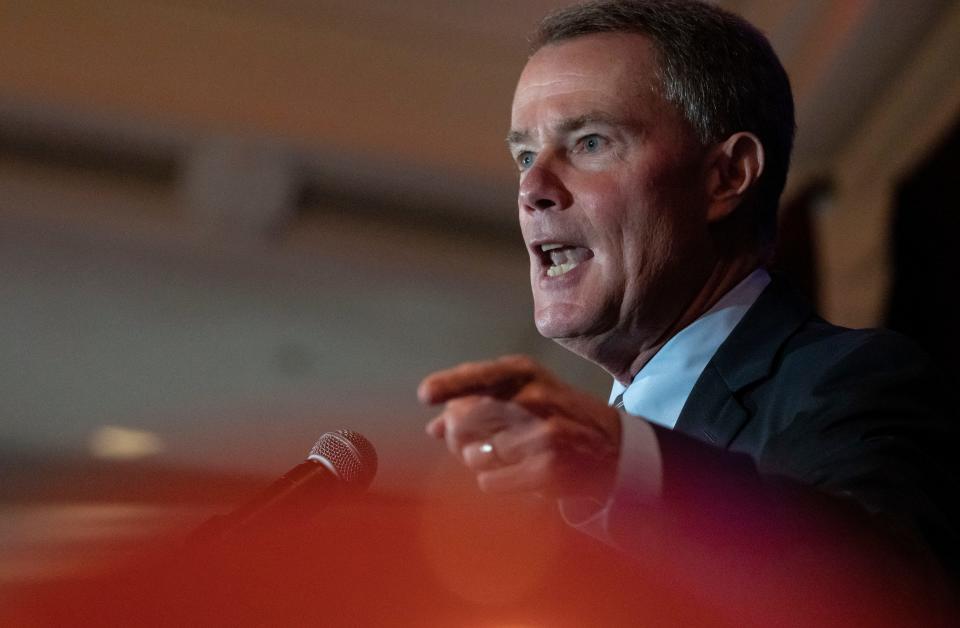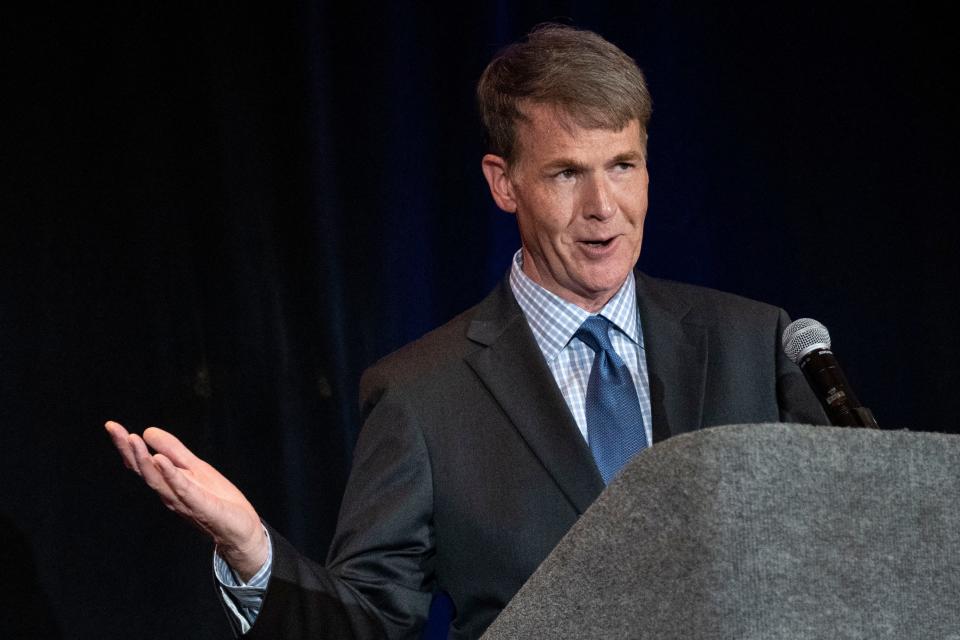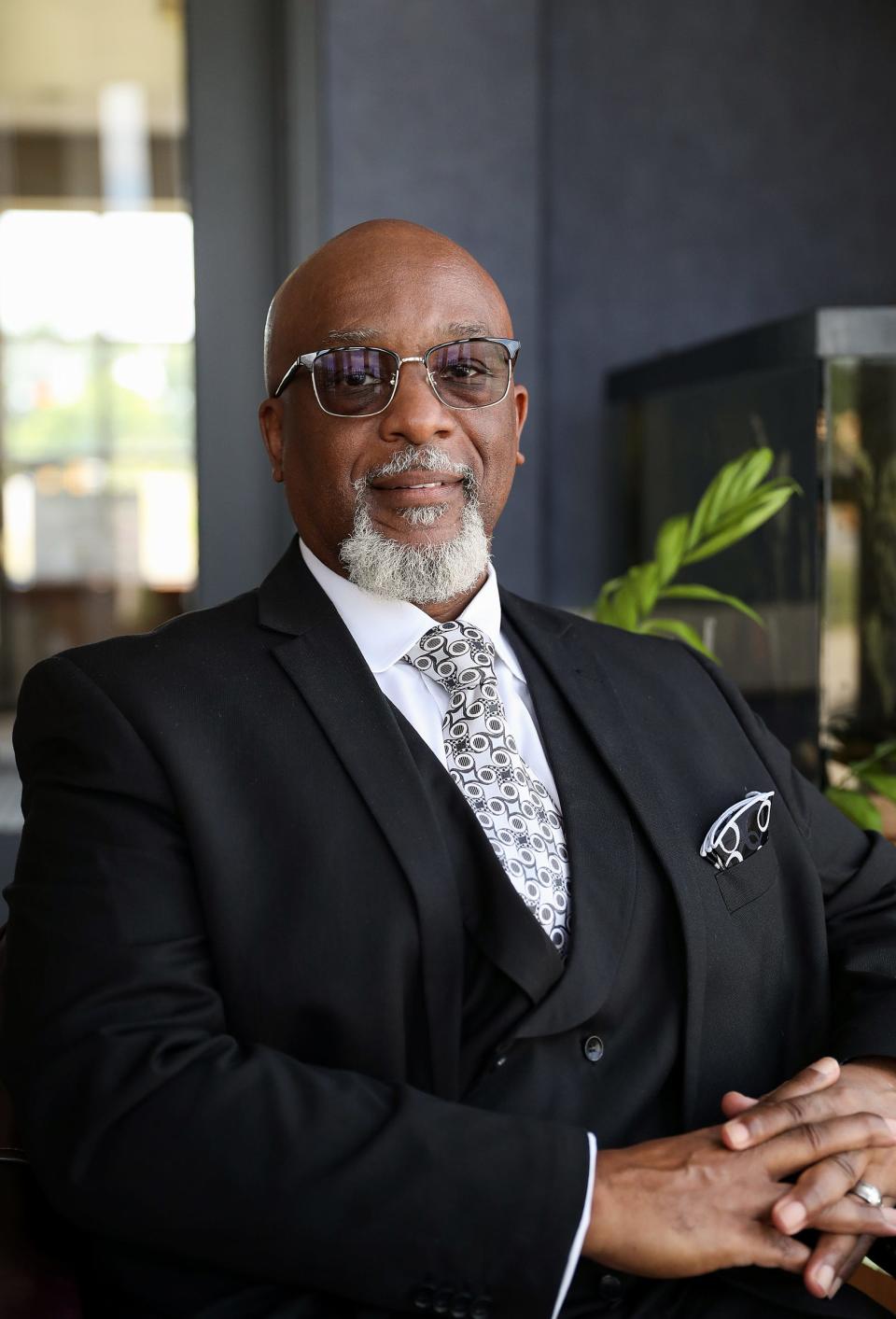High homicides, police shootings worry voters as Hogsett and Shreve bid for mayor
- Oops!Something went wrong.Please try again later.
Community members lambasted the police department over recent police shootings as well as low homicide solve rates earlier this month at a budget hearing while questioning the Hogsett Administration’s decision to grant the department a record high $323 million budget for 2024.
“We strongly oppose the excessive proposed budget of (more than $300 million) for IMPD under the umbrella of public safety,” Kristin Berry, speaking on behalf of the Justice for Herman Whitfield campaign, said at the Sept. 13 hearing. In April 2022, Whitfield was tased and handcuffed by police officers, who were later indicted, during a mental health crisis and died.
“At the very least, this proposed budget fails to address public safety for our most vulnerable citizens. We beg you to consider how this money could be spent on resources to address crisis situations long before they involve law enforcement.”
The community outrage toward Indianapolis police, heightened after two men were fatally shot by police last month, creates a tension for Mayor Joe Hogsett, who is running for reelection this year against Republican challenger Jefferson Shreve as Hogsett also fends off criticism over high homicide rates, a police shortage and low homicide solve rates.
Both candidates have to address concerns from left and right, making public safety a difficult issue to navigate in the mayoral campaigns. On one hand, community members have opposed the growing budget of IMPD, which has increased every year since Hogsett took office in 2016, arguing it is excessive given that the police are not best positioned to address mental health crises and other community-based issues. The Concerned Clergy of Indianapolis, a clerical activist group, also called for police chief Randal Taylor’s resignation in August over what they said was a lack of accountability in police shootings.
On the other hand, community members have also called for greater resources so IMPD can overcome its staffing shortage and address homicide rates, which remain high, although they have decreased since the deadliest year in 2021.
Indianapolis last year saw a 16% drop in the number of people killed in homicides from 2021. That decrease is significant. Nationwide, in 30 cities for which data was available, the number was 5%, according to a report by The Council on Criminal Justice.
There have been 134 criminal homicides and 448 non-fatal shootings in Indianapolis so far this year, as of Sept. 15, which is a 11% and 9% decrease respectively from the same time last year, according to IMPD data provided to IndyStar.
That said, criminal homicides have increased by 41% from 2016, Hogsett’s first year as mayor, to 2022.
Experts told IndyStar there is a playbook of data-supported strategies to reducing gun violence: hiring enough police, training them adequately, while investing in solutions to address the root causes of crime such as poverty and a lack of mental health resources, as well as gun control legislation.
Shreve and Hogsett battle over crime issue
Shreve has latched onto crime as Hogsett’s key weakness. Almost all his campaign advertisements focus on what he said is Hogsett’s failure to address high homicide rates.
Hogsett, meanwhile, points out that the pandemic brought unprecedented challenges to cities across the country, including rising crime.
His campaign has focused on how he’s hired more than 700 new IMPD officers since he took office and invested in anti-violence programs, including the city’s first mental health clinician-led team to respond to 911 calls without police and the Indianapolis Peace Fellowship, which provides life coaching to former violent criminals and those at risk of committing violence.
The 911 program started in July so it's difficult to analyze its effectiveness, although Julie Bingham, deputy director of behavioral health at the Office of Public Health and Safety, who oversees the program, shared anecdotes at the office's budget hearing that it is already saving lives. The peace fellowship started in January 2022.
David Muhammad, executive director of the National Institute on Criminal Justice Reform, which has a two-year contract to consult with the city, credited Indianapolis' decline in homicides and gun violence with the $150 million gun violence reduction program, particularly the Indianapolis Peace Fellowship.
“One of the most effective tools that Indianapolis is using and that is effective in places is mediation and intervention in conflicts," he said. "And connected to that is identifying individuals who are at very high risk and getting them into what Indianapolis calls the fellowship and basically connecting them to a life coach.”
Hogsett also defended his decision to fund IMPD at record levels three years after the 2020 racial justice protests. A spokesperson for the Mayor’s Office, Mark Bode, said the budget prioritizes police technology, higher pay, and transparency and accountability.
Hogsett also has promised transparency and accountability in investigating the recent police killings, pointing out that he has worked with IMPD on this.

He cited the creation of a new IMPD use of force policy in 2020, mandating civilian majorities on the Use of Force Review Board and the new General Orders Board in 2020, requiring body cameras to be worn on all police officers in 2020, and anti-bias and de-escalation training in the curriculum at the police academy, as examples of steps his administration has taken to prevent police shootings.
Observers — and Hogsett’s campaign — have noted similarities in Shreve and Hogsett’s policies, from increasing police recruitment and retention, to fully funding and equipping IMPD, to tackling the root causes of crime, to near-identical gun control proposals.
Shreve, a businessman and former city county councilman, said he’s nothing like Hogsett.
“The overarching difference between our candidacies is the person running for office,” Shreve told IndyStar. “Joe Hogsett is a politician; I’m not. I’m an experienced chief executive who knows how to run a large enterprise; he’s not.”
Police retention is Shreve’s top priority, he said, pointing out that IMPD has lost more officers than it has gained since Hogsett took office. IMPD is short of at least 300 police officers as of Aug. 14.
Shreve also said that Hogsett does not have the backs of police officers, that he would make officers feel supported, and that he would fill those vacant officer positions.

Shreve’s next priority is hiring a public safety director, a long-time position Hogsett eliminated when he took office in 2016 as part of bureaucratic restructuring that made the mayor de facto head of public safety with the police chief reporting directly to him. He instead created an Office of Public Health and Safety to focus on treating the root causes of crime.
The police union, the Indianapolis Fraternal Order of Police, is indifferent to the idea of reinstating that position, Rick Snyder, police union president, told IndyStar.
“We do not see the value of another layer of bureaucracy for policing,” Snyder wrote in a statement. “Instead, we prefer the value of a direct line of communication between the chief of police and the mayor allowing for clear lines of accountability for policy and management decisions.”
Shreve’s third public safety priority, he said, is to work with the prosecutor to seek stiffer penalties, close the “revolving door” of incarceration that puts violent criminals back on the street, and address the root causes of crime.
When asked if he supports the size of IMPD’s budget amid community criticism of the department, Shreve said, "I am fully supportive of IMPD and the budget they need to do their jobs. But there’s a public safety crisis in this city that money alone can’t solve.”
Shreve has blamed the recent police shootings on the Hogsett administration's "failure to support police" and pointed to the police shortage.
Shreve also said he would work his relationships with his fellow Republican Indiana state lawmakers to get gun control legislation passed, if elected. That idea earned Shreve the ire of the NRA and some local Republicans.
Community criticize IMPD's over homicide rates, police shootings
Community members have criticized IMPD’s low clearance rate for homicides, in particular, the fact that only 33% of homicide cases in 2022 were solved that year.
The Rev. David Greene Sr., pastor of the Purpose of Life Ministries on the west side and president of the Concerned Clergy of Indianapolis, said he is very concerned about the number of shootings in the city and low homicide solve rate.
He said the mayor and IMPD must focus on hiring more detectives to work on homicide and non-fatal shooting investigations, rather than just pushing for hiring more officers in general.
He also expressed skepticism of the mayoral candidates using public safety as a platform for political grandstanding, such as the way Hogsett and Shreve have advocated for gun control measures that Indianapolis cannot enact because of a state preemption law.
“Solve the issues that are in your direct purview,” Greene said.

Community members also took issue with that fact that IMPD, by its own admission, should not be dealing with mental health crises alone.
“This is a big issue that for many years has been thrown in the backs of law enforcement, which isn't fair, but we're moving toward the right way of handling individuals who need help,” Assistant Chief of Police Chris Bailey said at the budget hearing, in reference to mental health issues.
Only 20% of IMPD’s radio runs each day are related to actual law enforcement, Bailey said, while over 80% are for issues that aren’t built for law enforcement.
Greene, together with the Rev. Dr. Wayne Moore, senior pastor of Olivet Missionary Baptist Church, said it would make more sense to direct taxpayer dollars to mental health service providers, rather than to IMPD.
“In the presentation, IMPD believes that there is slight decrease in violent crime,” they wrote. “The money being spent in the budget should have created more of a decrease. If there had been no decrease, it would have been an abysmal failure.”
Community violence problems are more than a policing problem
Experts said that policing alone will not reduce high crime. In neighborhoods where violence is most concentrated, Muhammad said, like the far east side, near east side, and west side, violence stems from poverty.
“Those same neighborhoods are all plagued by poverty, low-performing schools, blight, lack of resources and opportunities, high levels of unemployment, and economic opportunity and then you layer onto that drugs, alcohol and guns and you get violence,” Muhammad said.
Tackling violence has to involve both law enforcement and non-law enforcement approaches, experts said.
“A lot of community violence problems are really much more community-based than a policing problem,” Christopher Herrmann, an Assistant Professor at CUNY John Jay College of Criminal Justice and national policing expert said.
At the same time, Herrmann said, police departments have to be adequately staffed. Record retirements in police departments across the country during the pandemic contributed to the police shortage, he said. In Indianapolis, an aging police force during the pandemic saw many officers retire.
Indianapolis’ city budget has the money to fund 1,743 police department employees with American Rescue Plan Act dollars budgeted for another 100. But as of Aug. 14, the department had only 1,542 sworn officers, fewer than it had in 2017 with 1,676.
Hogsett previously said the police shortage is a national problem and suggested that it resulted from a three-year-long hiring freeze during former Mayor Greg Ballard's administration.
Higher pay, better schedules for officers, and better training helps retain officers, Herrmann said.
Indianapolis has given big salary boosts to IMPD officers. The 2024 proposed budget includes money to continue paying first-year officers $72,000, a raise announced this spring. Second-year officers will earn $75,000, and the rest of the officers will see a 3% cost of living raise, as part of the 2024 collective bargaining agreement that covers many city employees.
This makes Indianapolis' recruit-officer pay substantially higher than many peer cities in the Midwest.
Ultimately, voters said they want the mayoral candidates to take steps to address gun violence and justify the expenditure of taxpayer dollars to produce meaningful results.
“What’s going to happen come January, when the election is over? ” Greene said. “Is that what we’re going to continue to do or is it campaign type stuff? Go and work on things that are in the direct purview of the mayor.”
The election is Nov. 7. Early voting starts Oct. 11.
Contact IndyStar reporter Ko Lyn Cheang at kcheang@indystar.com or 317-903-7071. Follow her on Twitter: @kolyn_cheang.
This article originally appeared on Indianapolis Star: Indianapolis mayor race: Voters worried about crime, police shootings

